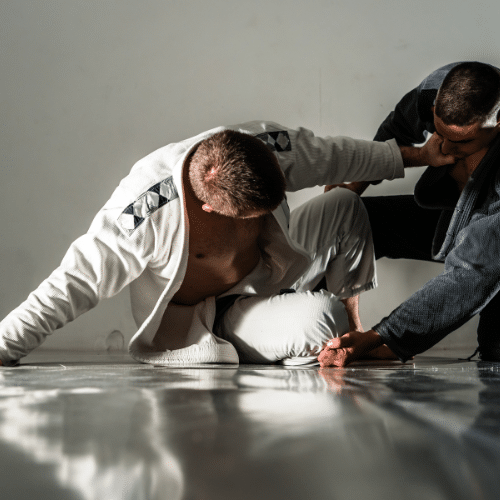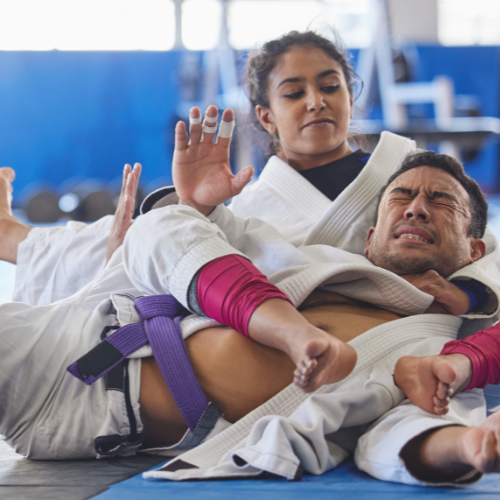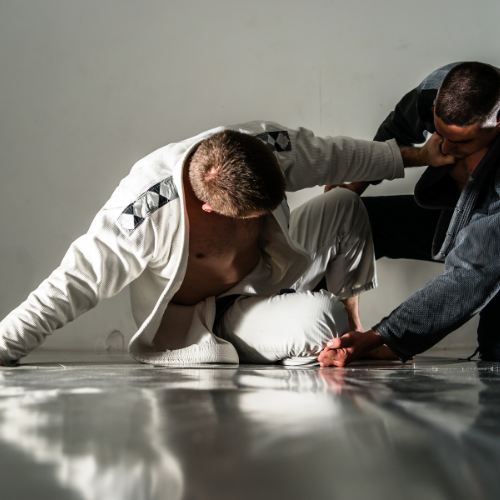

The Psychology Behind Successful Jiu Jitsu Moves
Introduction
Psychology plays a crucial role in martial arts, particularly in Brazilian Jiu-Jitsu (BJJ). BJJ is a martial art that focuses on ground fighting and submission holds, requiring immense physical strength, agility, and technique. However, the mental aspect of the sport is equally as important.
In BJJ, mental strategies and techniques work hand in hand with physical ones to maximize performance and ensure success. The ability to remain composed and focused, even in stressful and challenging situations, is a key component of mental strength in BJJ. This mental strength is what allows practitioners to make quick decisions, adapt to their opponents’ moves, and overcome obstacles effectively.
Moreover, psychology in BJJ helps cultivate a mindset of resilience, perseverance, and discipline. The mental preparation and visualization techniques used in training enhance a practitioner’s self-confidence and belief in their abilities. Additionally, understanding the psychological dynamics of the opponent can provide a strategic advantage, allowing a BJJ practitioner to exploit their weaknesses and capitalize on their vulnerabilities.
Overall, psychology in BJJ is fundamental in attaining success on the mat. The integration of mental strategies with physical techniques not only helps improve performance but also enhances the overall experience and personal growth in the martial art. As the saying goes, in BJJ, the battle often starts in the mind.

Understanding the Mental Game
Understanding the Mental Game in Brazilian Jiu-Jitsu (BJJ) is crucial for success in this demanding martial art. While physical training is undeniably important, a practitioner’s mental attributes play a significant role in their overall performance. Three key attributes that are vital for success in BJJ include focus, resilience, and adaptability.
Firstly, focus is essential in BJJ as it allows practitioners to remain present and aware during training and competitions. Maintaining focus enables individuals to anticipate their opponent’s movements, react swiftly, and execute techniques effectively. Without focus, BJJ practitioners may miss crucial opportunities or become overwhelmed by the intensity of the sport.
Secondly, resilience is a valuable mental attribute in BJJ. This combat sport demands persistence and determination, as it involves overcoming physical challenges and enduring discomfort. Resilience allows practitioners to thrive in challenging situations, such as when facing stronger opponents or when enduring the physical strain of training. It helps them bounce back from setbacks and continue to strive towards their goals.
Lastly, adaptability is vital in BJJ, as it is a dynamic sport with ever-changing scenarios. BJJ practitioners must be able to adjust their techniques and strategies according to their opponent’s moves and the given circumstances. An adaptable mindset allows individuals to think quickly, make necessary adjustments, and exploit advantageous positions during matches.
While physical training is essential for success in BJJ, the significance of psychological preparation should not be overlooked. By understanding and developing these mental attributes of focus, resilience, and adaptability, BJJ practitioners can enhance their overall performance and excel in this challenging martial art.
The Role of Mindfulness and Concentration
Mindfulness practices play a crucial role in enhancing concentration and performance during training and competition. By cultivating a present-moment awareness, athletes can effectively direct their attention to their physical sensations, thoughts, and emotions. This heightened state of attentiveness helps them stay connected to their bodies, enabling them to respond quickly and accurately to stimuli.
The techniques for improving presence and awareness on the mat involve various mindfulness practices. One such technique is focused breathing, which involves directing attention to the breath while disregarding distracting thoughts or emotions. This helps athletes anchor their awareness in the present moment, promoting concentration and preventing mental distractions.
Another technique is body scanning, where athletes systematically observe and bring awareness to the sensations in different parts of their body. By doing so, they become more attuned to their physical state, allowing for better control over their movements and reducing the risk of injuries.
Furthermore, mindfulness meditation can be used to cultivate a non-judgmental attitude towards one’s performance. This helps athletes reduce self-criticism, stay focused, and maintain confidence and motivation throughout the training or competition.
In summary, the role of mindfulness and concentration is vital in the realm of sports. By practicing mindfulness techniques, athletes can enhance their presence, awareness, and overall performance, leading to improved results on the mat.
Building Confidence and Overcoming Doubt
Building confidence in your BJJ abilities requires a combination of physical training and mental conditioning. Firstly, commit to consistent and intense training sessions to improve your skills and technique. The more you train, the more you will see progress, which in turn boosts your confidence. Surround yourself with positive training partners who offer constructive feedback and support.
However, confidence isn’t solely built on physical prowess, but also on mental strength. Self-doubt and the fear of failure can hinder your progress. To overcome this, practice mental conditioning techniques. Visualize success in your competitions or training sessions, picturing yourself executing techniques with precision and ease. This positive imagery helps rewire your brain to believe in your abilities.
Additionally, develop a positive mindset by focusing on your strengths rather than dwelling on weaknesses. Accept that failure and setbacks are a part of the learning process, and use them as opportunities for growth rather than reasons for self-doubt. Acknowledging your progress, no matter how small, will further boost your confidence.
Furthermore, remember to set realistic goals and celebrate your achievements along the way. Break down larger goals into smaller, achievable steps, allowing yourself to build confidence gradually. By setting and accomplishing these smaller goals, you’ll develop a sense of achievement and gain confidence in your abilities.
In conclusion, building confidence in BJJ involves a holistic approach of physical training and mental conditioning. Through consistent practice, positive visualization, focusing on strengths, and setting achievable goals, you can build self-confidence and overcome self-doubt to reach your full potential.
Stress Management and Performance Anxiety
Stress and anxiety can have a significant impact on an individual’s performance, especially in high-pressure situations such as sports matches. Understanding the effects of stress and anxiety on performance is crucial in order to effectively manage these factors and maintain composure under pressure.
Stress and anxiety can manifest as physical symptoms, such as increased heart rate, muscle tension, and shallow breathing, which can negatively affect an athlete’s performance. These physiological responses can hinder coordination, decrease motor skills, and impair decision-making abilities. Additionally, stress and anxiety can interfere with an athlete’s focus and concentration, leading to errors and lowered performance levels.
To manage pre-match nerves and maintain composure under pressure, athletes can utilize various techniques. Deep breathing exercises, for example, can help regulate heart rate and induce a state of relaxation. Visualization techniques, where athletes imagine themselves successfully performing the desired skills or actions, can enhance self-confidence and reduce anxiety.
Establishing routines and rituals before matches can also help manage stress and anxiety. These routines provide a sense of familiarity and control, instilling confidence in athletes and allowing them to better manage their emotions. Seeking support from coaches, teammates, or sports psychologists can also be beneficial as they can provide guidance and strategies for managing stress and anxiety.
In conclusion, understanding the impact of stress and anxiety on performance and implementing techniques for managing pre-match nerves are essential for athletes looking to maintain composure under pressure. By utilizing various strategies, athletes can enhance their performance and achieve their full potential in competitive sports.
Visualization Techniques
Visualization techniques have been proven to be highly effective in improving technique execution and strategic planning. By mentally rehearsing and visualizing the desired outcomes, athletes and individuals can enhance their performance and achieve their goals more effectively.
To incorporate visualization into your training routine, follow these step-by-step guidelines:
1. Find a quiet and comfortable place: Creating a peaceful environment will help you focus and concentrate on the visualization process.
2. Clear your mind: Take a few deep breaths and let go of any distractions or negative thoughts. It’s essential to have a calm and clear mind for visualization to be effective.
3. Define your goal: Clearly define what you want to achieve. It can be a specific technique, game strategy, or overall performance improvement.
4. Visualize success: Close your eyes and imagine yourself successfully executing the technique or strategy. Engage all your senses to make the visualization as vivid as possible. Feel the movement, hear the sounds, and imagine the positive emotions associated with your success.
5. Repeat regularly: Incorporate visualization into your daily training routine. Consistency is key in reinforcing neural connections and improving overall performance.
6. Reflect and adjust: After each visualization session, reflect on your experience and make any necessary adjustments. Visualize different scenarios, variations, or challenges to improve adaptability.
Remember that visualization is not a substitute for physical practice, but rather an enhancement to it. By incorporating visualization techniques into your training routine, you can improve technique execution, boost confidence, and enhance strategic planning to achieve your desired outcomes. So, start visualizing your success today!

Decision Making and Tactical Thinking
Effective decision-making in BJJ requires a strong understanding of the psychology behind it. A key aspect of this involves developing the ability to think tactically and make quick decisions under pressure.
Tactical thinking in BJJ is essential as it involves strategically analyzing the situation, considering various factors such as the opponent’s strengths and weaknesses, one’s own capabilities, and the specific context of the match. The ability to quickly assess these variables and adapt one’s strategy accordingly is crucial for making effective decisions during the fight.
Under pressure, decision-making becomes even more challenging. BJJ practitioners often find themselves in intense situations where split-second decisions can determine the outcome of a match. In such moments, maintaining a calm and focused mindset is vital to ensure rational decision-making.
To cultivate the ability to make effective decisions and think tactically in BJJ, mental preparation is key. This involves developing and refining strategies through consistent training, studying and analyzing various techniques and their applications, as well as visualizing different scenarios and possible responses. By training the mind alongside physical skills, practitioners can enhance their decision-making capabilities and perform at their best when it matters most.
In conclusion, effective decision-making in BJJ relies on understanding the psychology behind it. Developing the ability to think tactically and make quick decisions under pressure is crucial for success in this martial art. By prioritizing mental preparation, BJJ practitioners can enhance their decision-making skills and elevate their performance on the mat.
The Power of Grit and Perseverance
Grit and perseverance play a crucial role in overcoming challenges and setbacks. These attributes are particularly important in Brazilian Jiu-Jitsu (BJJ), where practitioners face constant physical and mental obstacles on their journey towards mastery.
Mental toughness is a key factor in developing the grit necessary to overcome these challenges. It involves the ability to stay focused, handle pressure, and bounce back from failure. Cultivating mental toughness requires consistent practice, self-reflection, and a growth mindset.
One strategy for cultivating grit and a growth mindset in BJJ is setting achievable goals. By breaking down larger objectives into smaller, realistic milestones, practitioners can experience a sense of progress and build confidence. Additionally, regularly assessing and adjusting these goals ensures a continuous growth trajectory.
Another strategy is embracing failure as an opportunity for growth rather than a setback. BJJ is a sport that requires frequent experimentation and risk-taking. Viewing failures as learning experiences and identifying areas for improvement allows practitioners to constantly develop their skills.
Finally, surrounding oneself with a supportive community can significantly enhance grit and perseverance. By training with like-minded individuals who share similar values and goals, practitioners can draw strength and motivation from each other. This sense of camaraderie can help overcome obstacles and push through difficult times.
In conclusion, the power of grit and perseverance in BJJ cannot be overstated. By cultivating mental toughness, setting achievable goals, embracing failure, and surrounding oneself with a supportive community, practitioners can develop the mindset necessary to overcome challenges and setbacks, ultimately reaching their full potential in this physically demanding and mentally challenging sport.
Learning from Defeat
Learning from defeat is essential for personal and professional growth. When facing setbacks and losses, it is crucial to adopt psychological approaches to process and extract valuable lessons from these experiences.
One effective approach is adopting a growth mindset. Viewing setbacks as opportunities for growth and improvement rather than defining moments of failure allows individuals to be more resilient and bounce back stronger. Emphasizing the belief that abilities and intelligence can be developed through dedication and hard work encourages individuals to persist and learn from defeat.
Another psychological approach is reframing the situation. Instead of dwelling on the negative aspects of the loss, individuals can reframe it as a chance to learn and gain new insights. This involves analyzing the situation objectively, identifying areas for improvement, and developing strategies to overcome similar challenges in the future.
Reflection is also an important aspect of learning from defeat. Taking the time to introspect and identify personal strengths and weaknesses can provide valuable information for self-improvement. It is essential to acknowledge shortcomings and seek ways to address them, whether through acquiring new skills or seeking support and guidance from others.
Furthermore, seeking feedback and learning from others is crucial. Constructive criticism from mentors, colleagues, or even opponents can provide valuable insights and perspectives that may have been overlooked. Adopting an open attitude towards feedback and embracing it as an opportunity for growth can lead to significant personal and professional development.
In conclusion, learning from defeat requires psychological approaches that involve adopting a growth mindset, reframing the situation, reflecting on personal strengths and weaknesses, and seeking feedback. By approaching setbacks as opportunities for growth, individuals can turn defeat into a catalyst for improvement and success.
Conclusion
In conclusion, mastering the art of Jiu-Jitsu goes beyond physical techniques; it requires a deep understanding and implementation of key psychological strategies. Throughout this article, we have highlighted several of these strategies that contribute to successful Jiu-Jitsu moves.
Visualization is a powerful tool that allows practitioners to mentally rehearse their techniques, enhancing their ability to execute them effectively. Developing mental toughness is another important strategy, as it enables practitioners to overcome challenges and setbacks on and off the mat. The ability to remain calm under pressure is also crucial, as it allows practitioners to think clearly and make strategic decisions in the heat of the moment. Finally, practicing mindfulness cultivates a heightened sense of awareness, enabling practitioners to read their opponents’ movements and react swiftly.
It is essential for Jiu-Jitsu practitioners to recognize the importance of devoting time to both their physical and mental game. While perfecting physical techniques is necessary, neglecting the psychological aspect can limit one’s progress. By incorporating visualization exercises, mental toughness training, and mindfulness practices into their training regimen, practitioners can unlock their full potential and achieve success in Jiu-Jitsu.
So, whether you are a beginner or an experienced practitioner, remember to prioritize the development of your mental game alongside your physical skills. By doing so, you will be well on your way to becoming a formidable force on the Jiu-Jitsu mat.
Advertisements
Granite Bay Jiu Jitsu
RELATED POSTS










